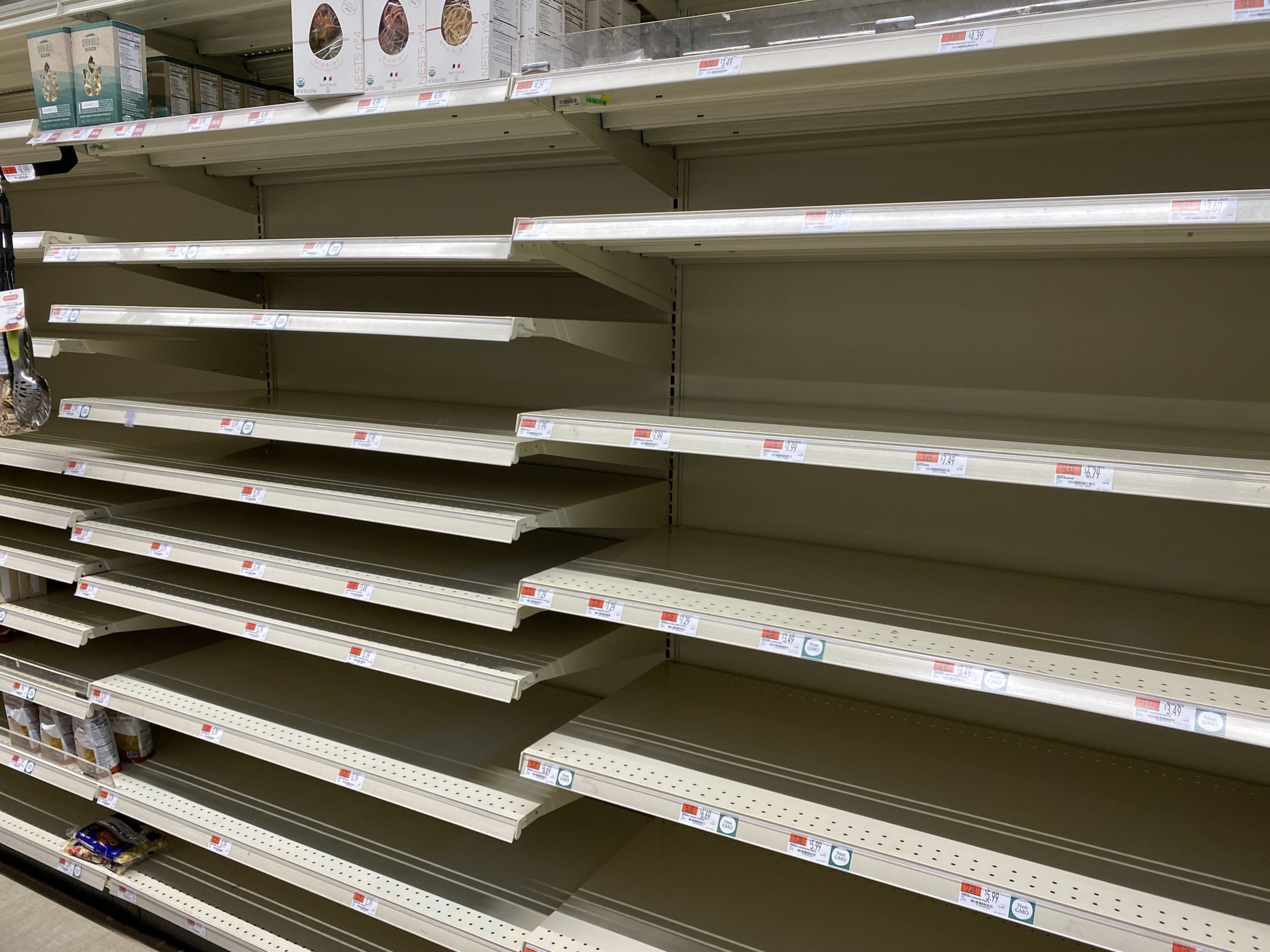
The pasta aisle at the Wellesley Whole Foods on March 13, 2020.
Some of the earliest dietary guidelines emphasized high-calorie foods, like butter and margarine, because so many young men were failing their military physicals due to malnutrition. Unlike some of our ancestors, who struggled through or perished in famines or economic depressions, my generation in this country has been lucky in that we could take our access to food for granted.
Of course, numerous exceptions exist. Needham’s food pantry and the SNAP stickers on supermarket refrigerators are evidence that some of our very own neighbors struggle to get enough to eat. When I visited grocery stores on isolated Native American reservations in middle-of-nowhere regions of Montana and North Dakota in 2006, I was floored by how limited the selections were. Poverty and food deserts are not the sole factors that can limit access to food, as some of my pediatric patients growing up in restrictive households could tell us. Dieters know that food scarcity can be self-imposed.
For the rest of us, the panic surrounding COVID-19, the associated hoarding of supplies, and the resulting empty shelves have inducted us into a sensation that so much of the human race has known, but we were too privileged to experience it firsthand.
Welcome to food insecurity.
Whether or not our food supply chain is actually at risk for significant disruption, the mere perception of a threat is enough to trigger feelings of food insecurity. We see the pasta shelves and potato bins empty, the milk section vacant, frozen produce nowhere to be found, and other typical supermarket staples gone, and we feel a visceral reaction that we had better get what we can while we can. Hence, we hear stories of people making purchases that in other circumstances would make little sense. For example, one of our patients was at Costco and ended up buying a gallon of mayonnaise, a condiment she does not even typically use, just because she could get her hands on it in the midst of the frenzy.
We can understand why. Dieters know that restriction, or the mere threat of it, triggers overconsumption. Thematically, little difference exists between someone loading up a shopping cart with whatever items they can and a person who overeats on the weekend while telling themselves, “Diet starts Monday.”
When it comes time to eat, the veil of food insecurity might compel us to finish all that we have served ourselves, lest we “waste” food by leaving it uneaten. My suggestions are to understand the source of these feelings and to validate them, but also to realize you still have a choice and remove moralization from whatever decision you make.
Keep in mind that we have in our lineage ancestors who survived extraordinary circumstances and may have attempted – for better or for worse – to instill their survival skills in us. For example, my grandparents, who grew up during the Great Depression, used to pressure me to clean my plate. As another example, one of my patient’s grandmothers is a Holocaust survivor and made it through her horrific ordeal by eating whatever she could whenever she could because her next feeding opportunity was never guaranteed; like my grandparents, she pressures my patient to eat more than he can comfortably consume, too.
In terms of what to do about potential overconsumption, there is no blanket answer that is right for everyone. Instead, I encourage people to be aware of the dynamics involved in their eating decisions, including any pressures and threats related to food insecurity that might be at play.
Consider the role that stress might have in your eating decisions and know that – contrary to what diet culture tells us – emotional eating is an understandable and relatively benign response to these troubling times. We all have to deal with our stress somehow, and each of us has a different toolbox of coping strategies. Before you feel badly about eating extra in an effort to soothe yourself, remember there are people in your neighborhood reacting to their stress in much more destructive fashions, such as shooting heroin or beating up their spouse. Eventually, we can expand our repertoire of coping options so that eating is just one of many choices we can make to de-stress.
Ultimate decisions matter less than having taken the time to thoughtfully arrive at them. Weigh the pros and cons of whatever options you face while understanding that none of them is likely perfect, choose the one that in balance feels the most right to you, and know that you are neither guilty nor virtuous for whatever choice you make.
Keep in mind that these times will not last forever. Quarantines and social distancing directives will end, restaurant dining rooms will reopen, and grocery store shelves will be fully stocked once again. When they do, be on the lookout for residual behaviors that may date back to your days of food insecurity, as we know from our ancestors that such behaviors can stick around long after the threat is gone.
